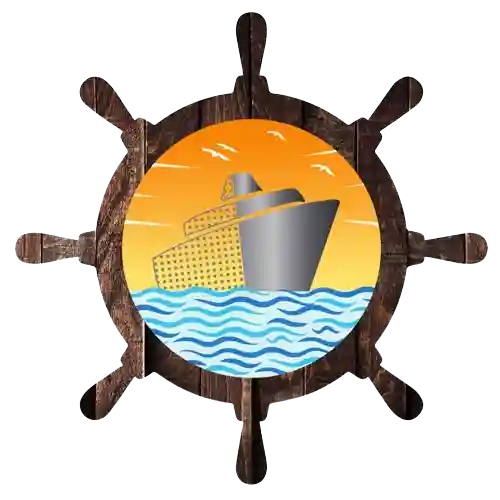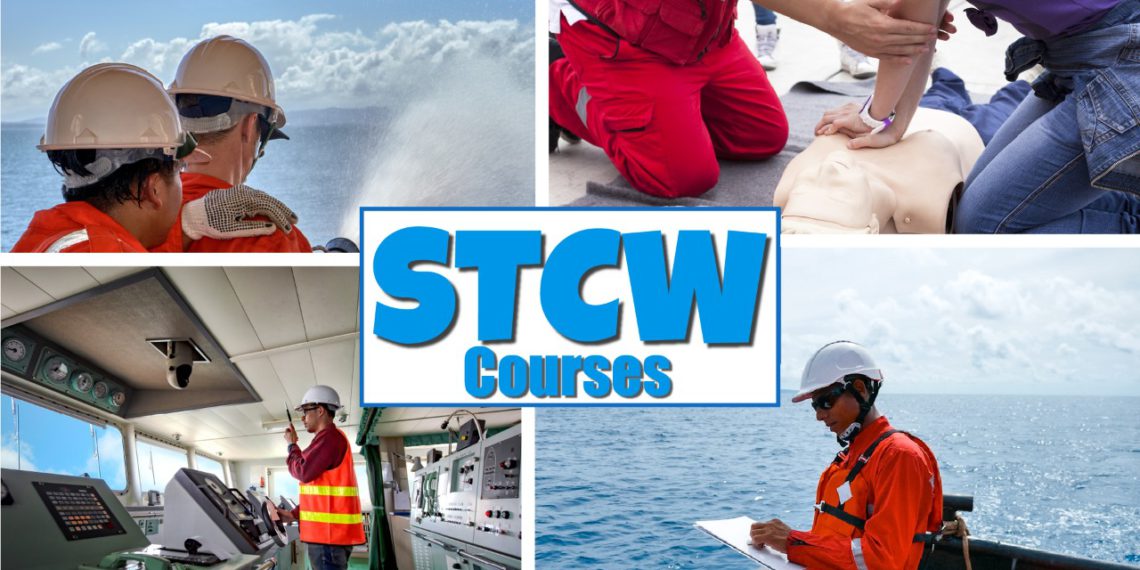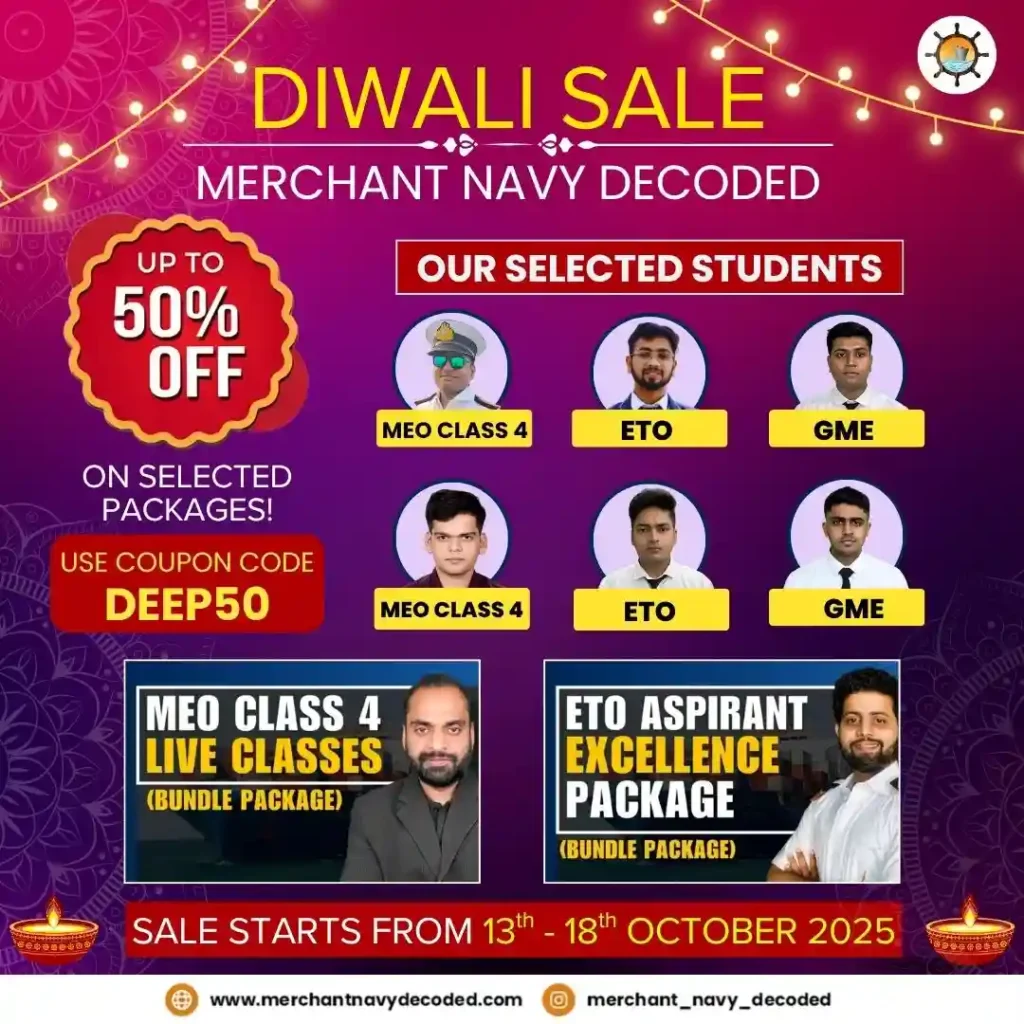Merchant Navy STCW courses
“Get STCW certified with Merchant Navy courses. Course provider approved by the industry for comprehensive training.”

The STCW stands for Standards of Training, Certification and Watchkeeping for Seafarers. The Merchant Navy is a line of employment that necessitates continuous learning, mainly on a professional level. The end of maritime college, is only the beginning of a lengthy period of academic correlation because in such a highly professional area as this, staying at the top of your game is essential.
Because of the nature of a professional mariner’s employment, high-quality training and education are essential, and STCW was the result, which was recognized by practically all seafaring nations for the benefit of the maritime industry, seafarers, and the environment as a whole. The International Convention on Requirements of Training, Certification, and Watchkeeping for Seafarers (STCW), 1978, as updated in 1995 (STCW95 & STCW 2010), now establishes the global competency standards for seafarers.
Following is the list of STCW courses for seafarers-
Courses for Deck and Engine Officers
Course certifications are issued by educational and training institutions, and the programmes delivered must meet STCW criteria. To offer the course and give certificates, they require permission from the relevant national marine agency certified. There are stricter restrictions for the accreditation of training institutions under the STCW 2010 amendment, and administrations must keep a list of approved providers, courses, and programmes available to enterprises and other parties. Check with the administrations of foreign flags to discover if these credentials are legitimate and certified under their respective legislation.
Seafarer training and certification is a continuous process, and each seafarer should double-check that their certifications are still valid for the contract they are about to sign. The International Maritime Organization (IMO) has produced a curriculum in partnership with the Food and Agriculture Organization (FAO), the International Labor Organization (ILO), and member countries that stresses any changed legislation from time to time.
Courses Under This Training Are:
- Chief Engineer Officer and Second Engineer Officer
- Electro-Technical Engineer
- Master and Chief Mate
- Officer In Charge of a Navigational Watch (OICNW)
- Officer In Charge of an Engineering Watch (OICEW)
Basic Safety Training (BST) Program

Seafarers working or engaged in any capacity on board ship, including deck and engine room rating credentials, most navigation, and all engineering certificates of competency, must complete STCW Basic Safety Training (BST) or STCW Basic Training (BT). The course is designed to provide knowledge to the newcomers, to the marine industry’s larger ships, as well as experienced mariners who have never received prior safety training. Which includes skills to contain, report, and respond to a marine emergency, fight fires, abandon ship, and understand the fundamentals of workplace safety.
Anyone seeking commercial work aboard vessels larger than 24 meters, including superyachts and cruise ships, must complete the STCW Basic Safety Training course. The delegate must be 18 years old or older to get a certificate of Basic Safety Training and must fulfil the criterion of competence for certificates of Basic Safety Training.
This course is designed to ensure that seafarers are aware of the dangers of working aboard a ship and are prepared to respond appropriately in an emergency.
Timeframe: 4-6 days (each course can be taken individually as well)
Eligibility: Must be 18 years old and fulfill the basic competency requirements as outlined in the guidelines.
Validity: 5 years of validity
Every 5 years, a refresher is required.
Courses Under BST Program
- Personal Survival Techniques PST (Practical Training)
- Elementary First Aid (Theory & Practical)
- Personal Safety and Social Responsibilities PSSR (Classroom Training)
Environment Related Training
The IMO’s operations are technical in nature, with the goal of improving maritime safety and preventing marine pollution. The International Maritime Organization (IMO) has developed a wide variety of measures to prevent and regulate ship pollution, as well as to alleviate the impacts of any environmental harm that may occur as a result of maritime activities and accidents.
The Marine Environment Protection Committee (MEPC) deals with environmental concerns, such as the management and avoidance of ship-source pollution covered by the MARPOL Treaty, such as oil, bulk chemicals, sewage, rubbish, and ship emissions, such as air pollutants and greenhouse gas emissions.
Courses Under Environment Related Training
- Energy Efficient Operation of Ships (2-day course)
- Marine Environmental Awareness (2-day course)
Firefighting Courses

Maritime firefighting abilities are critical for seafarers, and training is required to promote awareness of fires on seagoing vessels and improve safety in the case of a shipboard fire. Fires aboard ships may happen in any environment. Accidents, collisions, technical failure in engines, and cargo fires are the most common causes of fires on ships at sea. Fire dangers related with shipboard fires vary greatly, depending on the likelihood of accidents, the combustibility of the materials used in buildings, the types of cargo carried aboard ships, and other factors.
The main goal of the STCW Marine Firefighting Training Programs is to provide to the officers and crew the information and abilities they need to deal with fires on board a ship with confidence. The training improves crew and passenger safety while lowering the risk of major mishaps. The 1974 International Convention for the Safety of Life at Sea (SOLAS) has thorough fire safety regulations for all ships, as well as special provisions for passenger ships, cargo ships, and tankers.
The main goal is to provide officers and crew with the information and abilities they need to deal with fires on board a ship with confidence.
• Validity: Certificates have a 5-year validity period.
• Refresher: Every 5 years (for all certificates)
Courses Under Firefighting Program
- Fire Prevention and Firefighting (1 day course)
- Advanced Training in Fire Fighting (4-5 day course)
Maritime Safety Courses
The marine business is a significant industry that transports 90 percent of the world’s products, hence maritime safety is a vital aspect. For the industry’s safety aspect, the IMO and the national governments have enacted a number of laws and guidelines.
The human element, often known as the human factor, is one of the most important aspects of shipboard safety. Training is essential for a stronger emphasis on the human aspect.
• Certificates have a 5-year validity period.
• Every 5 years (for all certificates): Refresher
Courses Under Maritime Safety Program
- Personal Survival Techniques (PST) (1 day course)
- Personal Safety and Social Responsibilities (PSSR) (5-day course)
- Proficiency in Survival Craft and Rescue Boats (Other Than Fast Rescue Boats) (PSCRB) (5-day course)
- Proficiency in Fast Rescue Boats (FRB) (2-3 day course)
Medical Courses

Every seafarer must have a valid medical certificate issued in accordance with the provisions of regulation I/9 and Section A-I/9 of the International Maritime Organization’s (IMO) International Convention on Standards of Training, Certification, and Watchkeeping for Seafarers (STCW78) with subsequent amendments (STCW95 & STCW 2010).
The medical programmes include first aid and medical training with equipment, allowing students to obtain hands-on experience with shipboard equipment.
Medical Care teaches you how to respond appropriately to accidents and diseases when no outside medical help is available.
• Validity: Depends on the tasks and local legislation. Please consult your local marine administration’s regulations.
- Elementary First Aid (1 day course)
- Medical Care (5-day course)
- Medical First Aid (4-5 day course)
Courses Under Medical Program
- Elementary First Aid (1 day course)
- Medical Care (5-day course)
- Medical First Aid (4-5 day course)
GMDSS and Radio Courses

The Global Maritime Distress and Safety System (GMDSS) is a set of standards for navigational safety that has been implemented internationally. It was accepted by the IMO in 1988 as a set of revisions to SOLAS 1974, and it went into effect in 1992. GMDSS regulations apply to all ships, and they differ based on the kind of ship and the region of operations. The GMDSS system improves the safety of troubled boats, including maritime planes, and makes rescues more efficient.
The system will be used to send and receive ship-to-shore, shore-to-ship, and ship-to-ship distress alerts (including position determination); search and rescue communications; locating (homing); on-scene communications; locating signals; maritime safety information broadcasts; radio communications relating to the vessel’s management and operation; and bridge-to-bridge communications.
Marine radio courses give students the skills they need to succeed in today’s maritime sector. Any seafarer must participate in practical exercises utilizing advanced equipment. With an STCW endorsement, also known as an ITU certificate, you may no longer operate as a navigating officer on commerce seagoing boats with a radio certificate.
• Validity (above certificates): GOC and ROC are valid for 5 years, while Second-Class Radio electronic Certificates are good for a minimum of 5 years, depending on local requirements.
• Refresher (GMDSS): Every 5 years is required.
Courses Under GMDSS And Radio
- General Operator’s Certificate for GMDSS (GMDSS-GOC)
- Restricted Operator’s Certificate for GMDSS (GMDSS-ROC)
- Second-Class Radio Electronic Certificate for GMDSS
Radar & Navigational Courses
The goal of navigation is to figure out where you are now and what speed and direction you need to go to your destination. For navigational reasons, modern ships employ a range of technological systems and computerized navigational instruments.
Therefore, students gain knowledge via a combination of skills training, shipboard training, and academic courses, as well as hands-on equipment instruction.
Courses Under Radar and Navigational Program
- Automatic Identification Systems (AIS)
- Operational Use of Electronic Chart Display and Information Systems (ECDIS)
- Operational Use of Integrated Bridge Systems (IBS) Including Integrated Navigation Systems (INS)
- Radar Navigation, Radar Plotting and Use of ARPA – Radar Navigation at Operational Level
- Radar, ARPA, Bridge Teamwork and Search and Rescue – Radar Navigation at Management Level
Maritime Security Courses
The International Ship and Port Facility Security Code (ISPS Code), which was adopted by the International Maritime Organization (IMO) in December 2002, is a comprehensive set of measures designed to improve the security of ships and port facilities. It was created in response to perceived threats to ships and port facilities.
Courses Under Maritime Security
- Proficiency in Security Awareness (PSA)
- Security Training for Seafarers with Designated Security Duties (STSDSD)
- Ship Security Officer (SSO)
- Company Security Officer (CSO)
- Security Awareness Training for All Port Facility Personnel
- Security Awareness Training for Port Facility Personnel with Designated Security Duties
- Actions to be taken to Prevent Acts of Piracy and Armed Robbery
Ship Simulator Courses

Unlike conventional training aboard a ship, the simulators provide advanced instruction on Ship Handling Techniques for seafarers, and they may be trained in a variety of settings or scenarios.
Simulators must meet certain performance requirements, and there are two types of simulators: those used for training and those used to measure competency.
This course gives delegates a fundamental and advanced understanding of ship handling concepts
Courses Under Ship Simulator Program
- Conventional Simulator Training
- Chemical Tanker Cargo & Ballast Handling Simulator
- Engine-Room Simulator
- Liquefied Natural Gas (LNG) Tanker Cargo & Ballast Handling Simulator
- Liquefied Petroleum Gas (LPG) Tanker Cargo & Ballast Handling Simulator
- Oil Tanker Cargo and Ballast Handling Simulator
- Ship Simulator and Bridge Teamwork
- Train the Simulator Trainer and Assessor
Cargo Operations Courses

Cargo operations are a specialist sector on every commercial ship where operational safety is a top priority. If cargo is handled by unskilled people, there are significant threats to seafarer safety and individual seafarers. Due to the nature of modern cargo handling equipment, seafarers who are assigned to handle cargo are trained in this field.
The training programmes may involve, among other things, the use of different protective equipment, safety devices and procedures, cargo securing, lifting equipment use and related safety procedures, and enclosed space access.
To securely handle goods aboard ships, it is critical to understand key safety aspects and how to use materials handling equipment.
Courses Under Cargo Operations Program
- Basic Training for Liquefied Gas Tanker Cargo Operations
- Basic Training for Oil and Chemical Tanker Cargo Operations
- Dangerous, Hazardous and Harmful Cargoes
- Safe Packing of Cargo Transport Units (CTUs)
- Specialized Training for Liquefied Gas Tankers
- Specialized Training for Oil Tankers
Ship Survey, Port State Control & Search and Rescue Courses

The 1974 IMO SOLAS convention, which went into effect in 1980, governs necessary safety features for ships on international trips, including construction, stability, machinery, electrical systems, fire safety, life-saving equipment, navigation, communications, and cargo transportation.
The IMO course standards are followed by senior staff aboard and ashore who are responsible for such surveys. These courses address the SOLAS requirements for the initial, annual, intermediate, and periodic surveys.
The Company and the vessel’s Master appoint a person on board the ship as a Ship Security Officer (SSO).
Port State Control (PSC) is an international agreement that allows foreign ships to be inspected in ports. PSC officials look into whether international conventions like SOLAS, MARPOL, STCW, MLC, and others are being followed.
The International Convention on Maritime Search and Rescue (SAR), which went into effect in 1985, is an international system that covers search and rescue operations. If necessary, a SAR organization will coordinate the rescue of persons in distress at sea with the help of neighboring SAR organizations.
SAR is meant to help the student with the methods to be followed, as well as the contents of the International Aeronautical and Maritime Ship Search and Rescue Manual (IAMSAR).

Courses Under Ship Survey
- Hull and Structural Surveys
- Survey of Electrical Installations
- Survey of Fire Appliances and Provisions
- Survey of Life-Saving Appliances and Arrangements
- Survey of Machinery Installations
- Survey of Navigational Aids and Equipment
Courses Under Port State Control
- Flag State Implementation
- Port State Control
Courses Under Search And Rescue
- SAR Administration (IAMSAR Manual Volume I)
- SAR On-Scene Coordinator (IAMSAR Manual Volume III)
IMO has created and established various Model Courses for maritime training institutions and helps the training intuitions (approved by the national government) to increase the knowledge pool and capacities for educating seafarers, based on the expertise of specialists in the sector. These courses are taught by a variety of universities across the world in collaboration with local marine administrations, and they have become an important part of the maritime ecosystem.
Liked reading our blog? We have some more options that would interest you-
Joining as a New Deck Cadet? Things to Keep in Mind!
Disclaimer :- The opinions expressed in this article belong solely to the author and may not necessarily reflect those of Merchant Navy Decoded. We cannot guarantee the accuracy of the information provided and disclaim any responsibility for it. Data and visuals used are sourced from publicly available information and may not be authenticated by any regulatory body. Reviews and comments appearing on our blogs represent the opinions of individuals and do not necessarily reflect the views of Merchant Navy Decoded. We are not responsible for any loss or damage resulting from reliance on these reviews or comments.
Reproduction, copying, sharing, or use of the article or images in any form is strictly prohibited without prior permission from both the author and Merchant Navy Decoded.



Merchant navy training held on 2025
Hi Rahul, if you want to know how to join the Merchant Navy then you can check out our free How to Join the Merchant Navy Guidance Series. This series will tell you the best course you can take to join the Merchant Navy based on your education details.
Hi Rahul, if you want to know how to join the Merchant Navy then you can check out our free How to Join the Merchant Navy Guidance Series. This series will tell you the best course you can take to join the Merchant Navy based on your education details.